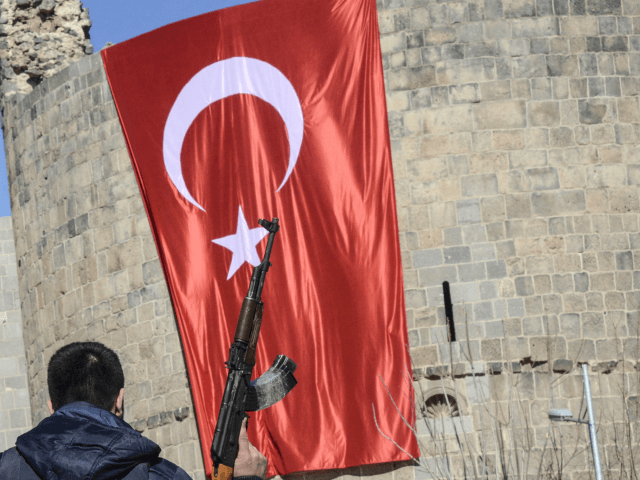Turkey needs to deploy more troops to Syria’s Idlib province as part of its deal with dictator Bashar al-Assad’s ally Russia to establish a demilitarized zone in the region to separate rebel-held and regime-controlled areas, Turkish Foreign Minister Mevlut Cavusoglu declared on Tuesday.
Hurriyet Daily News quotes the FM as saying in Ankara:
We need extra troop reinforcements. Idlib’s borders will be protected. People will stay in their place. Russia will take necessary measures to prevent attacks against this region and to keep the regime from entering there. Twelve of our monitoring stations will remain…The borders of Idlib will be protected under the memorandum of understanding signed in Sochi. There would be no change in the status of Idlib.
Cavusoglu’s comments came a day after Turkey and Russia agreed to create a demilitarized zone in Idlib following a meeting between Turkish President Recep Tayyip Erdogan and his Russian counterpart Vladimir Putin in Russia’s coastal city of Sochi.
Erdogan and Putin reportedly signed a memorandum of understanding on Monday to establish a nine- to 15-mile wide zone by October 15 to push out jihadist groups like the al-Qaeda branch known as Jabhat al-Nusra, withdraw heavy weapons, and implement a ceasefire between opposition forces and pro-Assad troops.
“Civilians will stay; only terrorist groups will be removed,” Cavusoglu said.
Under the agreement, Russian and Turkish troops are expected to conduct joint patrols along the zone’s perimeter.
On Monday, Turkey’s Daily Sabah reported:
The province of Idlib in northwestern Syria is the largest bastion of the opposition, and Turkey has been eager to prevent a potential regime offensive there.
Russia calls Idlib a hotbed of terrorism and says the Syrian regime has the right to retake control of it. Turkey has appealed to Russia and Iran for a diplomatic resolution to the ticking bomb. At the same time, it has sent reinforcements to its troops ringing Idlib, a move designed to ward off a ground assault, at least for now.
Al-Qaeda’s branch in Syria — considered the terrorist group’s “strongest” wing — has established its primary stronghold in Idlib. The near single-minded focus of international troops to defeat the Islamic State (ISIS/ISIL) in Iraq and Syria has allowed Jabhat al-Nusra, also known as the Nusra Front, to surface as the most potent jihadi group in the region.
In July 2017, Katherine Zimmerman from the American Enterprise Institute told U.S. lawmakers:
Al Qaeda is strongest in Syria, where it has used the conditions created by the Syrian civil war and [the U.S.-led coalition’s] Operation Inherent Resolve against ISIS to establish deep sanctuary in the northwest and position itself to expand farther into the Syrian theater. Al Qaeda is consolidating control over Idlib province, which it likely will retain uncontested in the near term.
Through Jabhat al Nusra and Salafi-jihadi organizations such as Ahrar al Sham, al Qaeda co-opted the majority of Syria’s mainstream opposition into the Salafi-jihadi ranks, establishing itself as the dominant force within the northern Syria’s opposition. Al Qaeda has set conditions for the future establishment of an Islamic emirate—not necessarily under al Qaeda’s name—that will secure al Qaeda’s objective to build an Islamic polity in Syria.
In 2016, the al-Qaeda affiliate in Syria changed its name from the Nusra Front to Jabhat Fateh al-Sham (JFS).
JFS jihadis are now spearheading a jihadist coalition in Syria known as Hayat Tahrir al-Sham (HTS).
The al-Qaeda-linked group’s territory is concentrated in northwestern Idlib province in Syria but has also expanded to small areas in the southern part of the country along the border of Israel and Jordan as well as areas Assad’s seat of power in Damascus, according to a map by the Institute for the Study of War.

COMMENTS
Please let us know if you're having issues with commenting.